Sorting by "Updated at"
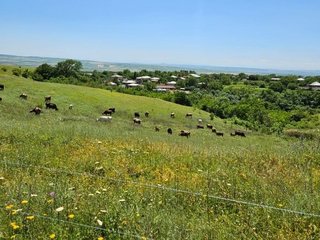
Controlled Grazing [Géorgie]
“Controlled Grazing” seeks to harness the behaviours and habits of ruminant livestock to enhance three key ecological functions, namely the removal of plant biomass (grazing), soil and vegetation disturbance (animal impact) and increased nutrient cycling (dung and urine), with the goal of increasing perennial grass establishment, pasture palatability and reducing bare ground and erosion.
- Compilateur:
- Nicholas Euan Sharpe
- First published:
- 2026-01-09 12:45
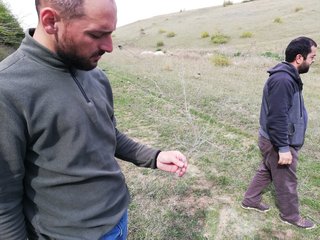
Participatory Grassland and Rangeland Assessment (PRAGA) [Géorgie]
The Participatory Rangelands and Grasslands Assessment Methodology (PRAGA) is a rapid, cost-effective framework for the integrated assessment of rangeland ecosystems, incorporating diverse data sources and participatory approaches. PRAGA facilitates stakeholder engagement through consultations and workshops, underpinned by community-based mapping of grazing areas, land use dynamics, and trend analyses.
- Compilateur:
- Nicholas Euan Sharpe
- First published:
- 2025-12-16 08:26
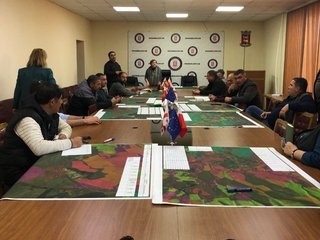
Municipal Pastureland Planning [Géorgie]
The Municipal Pastureland Planning approach was developed collaboratively with key national and local stakeholders to establish a structured, evidence-based decision support framework for sustainable rangeland governance. This system consolidates and presents data from diverse stakeholder groups in a format fully compatible with the Land Degradation Neutrality Framework, ensuring that planning aligns with both environmental and socio-economic objectives.
- Compilateur:
- Nicholas Euan Sharpe
- First published:
- 2025-12-16 08:26
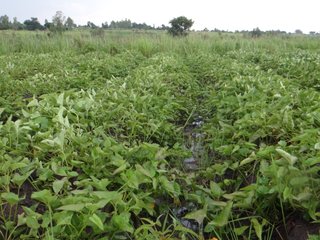
Potatoes Growing in Lowlands for Food Security Durnig Dry Seasons [Ouganda]
Lowlands have relatively high water tables and contain sufficient soil moisture to permit potatoes growing. Potatoes can grow in such areas compared to other staple crops like cassava.
- Compilateur:
- Bernard Fungo
- First published:
- 2020-05-14 17:04
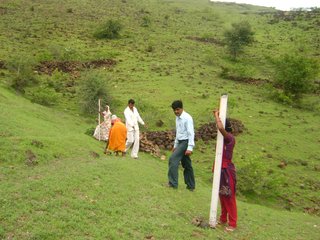
Participatory Net Planning for Sustainable Watershed Management [Inde]
Participatory Net Planning (PNP) is a practical methodology that actively engages landowners and local stakeholders in planning and implementing measures for land use, soil conservation, water harvesting, and biomass development. It aims to regenerate ecosystems and improve the sustainability of watersheds through site-specific resource management. PNP emphasizes the conservation, productivity enhancement, and sustainable use of natural and biological resources. It involves assessing the current condition and use of land, water, and vegetation, and preparing detailed plans—with estimated costs and timelines—to achieve the desired outcomes. In Participatory Net Planning (PNP), the term “Net” represents a complete and interconnected planning framework where every land parcel within a watershed is individually assessed and linked to the larger watershed system. It highlights a network-based approach that integrates soil, water, vegetation, and community needs, ensuring that interventions on one farm support resource conservation and productivity across neighboring and downstream lands. Overall, it signifies a holistic and coordinated system where all stakeholders and resources are planned collectively for sustainable and long-term watershed management.
- Compilateur:
- Arun Bhagat
- Création:
- 2025-10-07 10:31
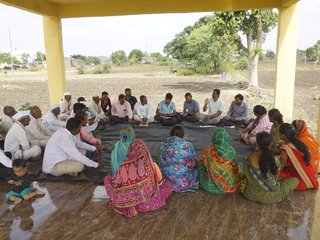
Ecosystem based Adaptation (EbA) through Farmers’ Collectives for Sustainable Management of Natural Resources [Inde]
The Ecosystem-based Adaptation (EbA) with Farmer Collective (henceforth Farmer Producer Organisations (FPOs)) approach strengthens farmers’ resilience to climate change by integrating sustainable water- and land management, biodiversity enhancement and resources governance within farmers’ collectives. Implemented in semi-arid regions of Maharashtra and Telangana, the approach combines capacity building, improving soil health, through women-led green business aiming at enabling eco-sensitive and economically viable FPOs.
- Compilateur:
- Arun Bhagat
- First published:
- 2025-11-30 12:40
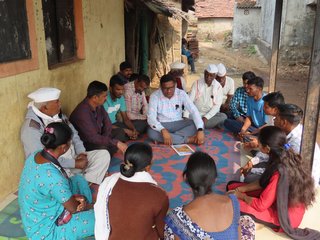
Capacity Building Process for Participatory Watershed Development [Inde]
The Capacity Building Process for Participatory Watershed Development is a structured approach to strengthen the technical, managerial, and social skills of Non-Governmental Organizations (NGOs), Partner Implementation Agencies (PIAs), and Village-level Institutions (VIs). It includes orientation, training, participatory tools, mentoring, exposure visits, monitoring, and institutionalization. The process enhances competencies, fosters creativity and confidence, promotes community ownership, and ensures effective, sustainable planning, implementation, and management of watershed-based natural resource management and climate-resilient interventions.
- Compilateur:
- Arun Bhagat
- Création:
- 2025-10-09 11:35
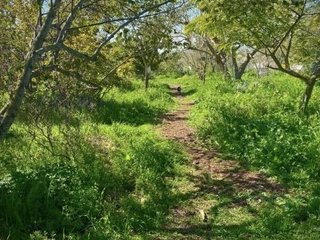
Conversion of conventional monoculture farmland into a food forest [Israël]
Converting conventional monoculture farmland into a food forest-based agroforestry system restores soil health, increases vegetation cover, enhances biodiversity while diversifying production. The intervention improves soil organic matter and ecological resilience through multi-storey planting, reduced soil disturbance, and nature-based land management.
- Compilateur:
- Tom Cohen
- First published:
- 2025-11-12 07:46
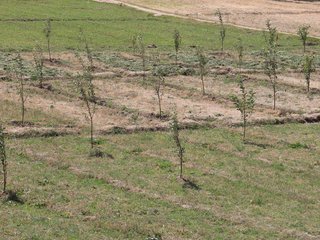
Agroforestry to improve soil fertility, water retention, and sustainable income for local communities [Afghanistan]
The Agroforestry system in Malistan district combines traditional practices with support from the Community-Based Sustainable Land and Forest Management project in Afghanistan. This initiative provides technical support, training, and resources like apple trees, fertilizers, and alfalfa seeds to establish 400 orchards (1,000 m² each). The goal is to enhance community livelihoods by reducing dependence on rangelands, helping to preserve local ecosystems.
- Compilateur:
- Ahmad Zia Jalalzai
- First published:
- 2025-11-04 09:08
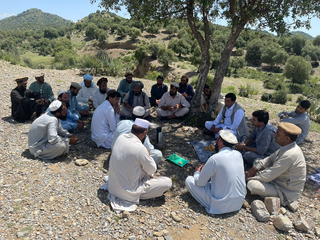
Stakeholder collaboration for building Learning Site for landscape restoration [Afghanistan]
To raise awareness and ensure clear role delineation, a series of consultations were held with the local community, the Forest Management/Rangeland Management (FM/RM) association, and other key stakeholders. Memorandum of Understanding (MoU) that formally outlined the roles and responsibilities of each party was signed. Additionally, the FM/RM association issued a letter of guarantee to support the establishment of a learning site dedicated to promoting best practices in forest and rangeland management. (e.g. cumin) through community’s own contributions.
- Compilateur:
- Mohammad Arif
- First published:
- 2025-10-17 14:46
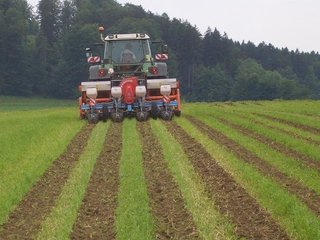
Maize strip tillage [Suisse]
A cropping system for maize which reduces the reworking of the soil to the stripes, in which the seeds are planted.
- Compilateur:
- Roman Wyler
- First published:
- 2017-03-09 14:31
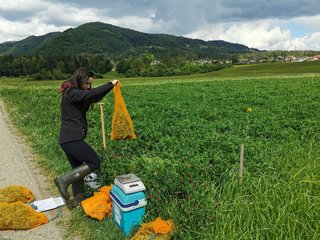
Crimson clover as an overwintering cover crop for nitrogen supply [Slovénie]
Crimson clover, overwintered as a cover crop, forms a symbiotic relationship with nitrogen-fixing bacteria, capturing nitrogen and thus enriching the soil. This helps reduce the need for synthetic fertilizers and aids in soil erosion control, weed suppression, and improved soil structure.
- Compilateur:
- Tamara Korošec
- Création:
- 2025-03-19 12:14
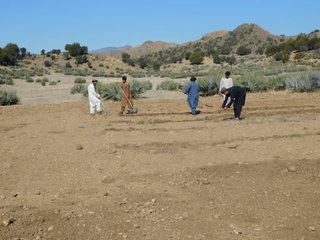
Learning Site to promote Sustainable Land and Forest Management Practices in Khost [Afghanistan]
The learning site incorporates several key elements of the technology including a solar-powered water lifting system, three reservoirs and an adopted irrigation system. It features demonstration plots for various initiatives, such as tree planting (walnut, almond, pomegranate and mulberry, the cultivation of fodder (alfalfal Mazari palm) and and medicinal plants (e,g, cumin), and a nursery (walnut) established through the community’s own contributions.
- Compilateur:
- Mohammad Arif
- First published:
- 2025-10-17 14:46
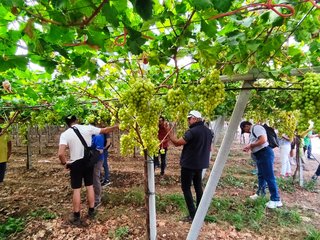
Organic Farming of Table Grapes [Italie]
Organic Farming (OF) of table grape production in Apulia region is estimated at 8.5% of the total area. The advantages of OF include an increase in soil organic matter, better water holding capacity and lower soil salinity.
- Compilateur:
- Pandi Zdruli
- First published:
- 2025-10-16 13:56
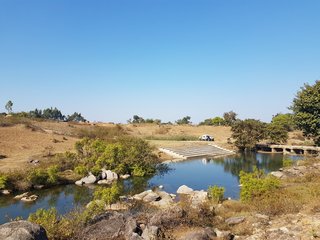
Experiential Learning Tools for Sustainable Water Management [Inde]
The project “Scaling up experiential learning tools for sustainable water governance in India” aimed at enhancing sustainable water management at scale by improving the capacities of 1,500 rural communities covering 105,000 households directly and 2,000 communities covering 140,000 households indirectly in six Indian states to manage water more sustainably. This was achieved through experiential learning from collective action games, structured community debriefings, and participatory water planning tools that contribute to greater awareness and improved governance, inducing behavioural change toward more sustainable water governance and management. The work was jointly conducted by the Foundation for Ecological Security, India (FES), the International Food Policy Research Institute (IFPRI) and the International Crops Research Institute for the Semi-Arid Tropics (ICRISAT).
- Compilateur:
- Vishwambhar Duche
- First published:
- 2025-03-26 23:13
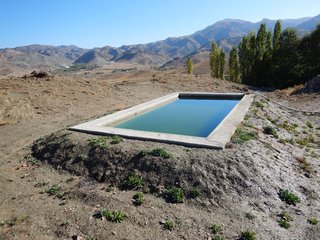
Gravity Irrigation for enhancing Community-Based Restoration efforts in the degraded forests of Paktya [Afghanistan]
Using a gravity-irrigation system, spring water is diverted to fill reservoirs and then distributed to fields for the restoration of degraded forest areas, with the active involvement of local communities and a focus on the sustainable use of water resources (spring water).
- Compilateur:
- Mohammad Wazir Ahmadzai
- First published:
- 2025-10-17 14:46
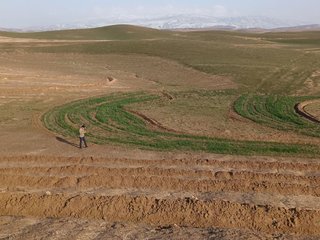
Contour trenches and contour strips [Ouzbékistan]
Contour trenches for the cultivation of almond trees, and contour strips for cereals are types of rainwater harvesting structures. They are designed to capture runoff, reduce erosion, and enhance soil moisture—thereby improving land productivity and supporting climate-resilient agriculture in lowland dry areas.
- Compilateur:
- Joren Verbist
- First published:
- 2025-07-09 17:31
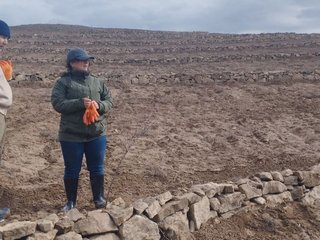
Gradoni Orchard Terraces [Ouzbékistan]
Gradoni orchard terraces are intermittent strips of contour-based structures separated by catchments of about 10 metres. They are designed to capture and hold rainwater, reduce erosion, and improve conditions for the cultivation (in this case) of almond and pistachio trees, thereby enhancing land productivity and climate resilience in dryland areas.
- Compilateur:
- Joren Verbist
- First published:
- 2025-07-09 17:31
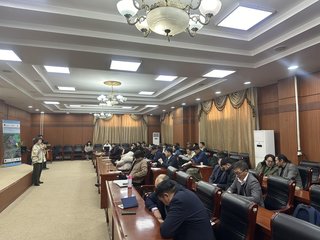
Mentorship programme on conservation agriculture [Mongolie]
The Approach aims to ensure the sustainability of the agricultural sector by training and mentoring young farmers in conservation agriculture to improve soil fertility and health and maintain productivity.
- Compilateur:
- Otgontsetseg Davaanyam
- First published:
- 2024-06-26 18:52
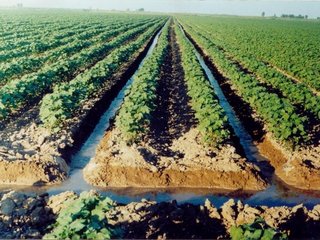
Water-conservation technology at cultivation of the cotton in south. K [Kazakhstan]
The technology of watering through furrow reduces the settlement (recommended) sizes of irrigating norms up to 30% keeps soil fertility
- Compilateur:
- Unknown User
- First published:
- 2017-05-26 11:32
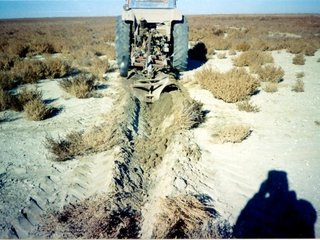
Technology of fastening Aral sea's drained bottom' s soil [Kazakhstan]
Technology of fastening Aral Sea's drained bottom's soil
- Compilateur:
- Vladimir Kaverin
- First published:
- 2017-05-25 17:10
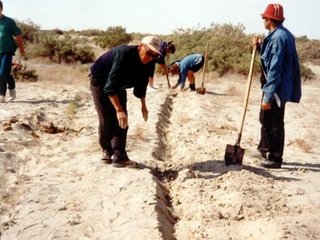
creation of meliorative plantings for struggle with erosion [Kazakhstan]
Technology of creation of meliorative plantings for struggle against wind and water erosion
- Compilateur:
- Vladimir Kaverin
- First published:
- 2017-06-01 15:14
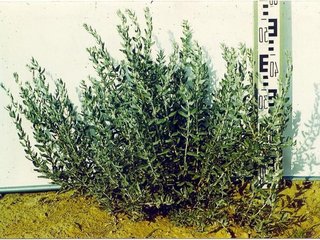
Creation of artificial pasturable phytocenosis at north desert subzone [Kazakhstan]
Selection fodder plants and the technology of their cultivation for maximal use of poor soil water in desert
- Compilateur:
- Unknown User
- First published:
- 2017-05-26 13:50
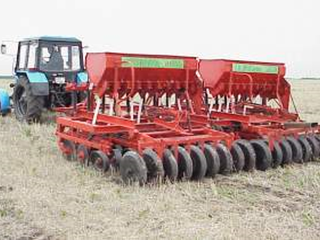
Conservation Agriculture for cereal production in rainfed areas of Kazakhstan [Kazakhstan]
Conservation agriculture applied in Northern Kazakhstan is based on no-tillage direct sowing of cereals into the soil permanently covered by crop residues. It contributes to reverse soil degradation, enhance water use efficiency, increase crop productivity in the rainfed lands.
- Compilateur:
- Kulyash Iskandarova
- First published:
- 2020-03-09 14:59
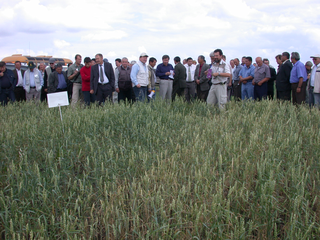
Awareness Raising for SLM Using Conservation Agriculture [Kazakhstan]
Raising awareness and strengthening the capability and skills of farmers, agriculture specialists and researchers in developing and adoption resource-saving, profitable and environmentally friendly cereal production through Conservation Agriculture practices.
- Compilateur:
- Kulyash Iskandarova
- First published:
- 2020-03-10 09:39
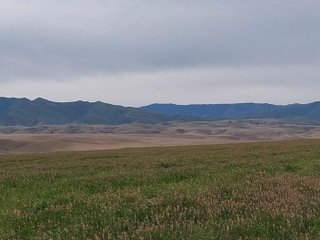
Creation of sown cultural pastures for summer-autumn use in the conditions of the foothill zone of south-eastern Kazakhstan [Kazakhstan]
Creation of cultivated pastures for summer-autumn use with sowing of perennial drought-resistant forage crops (sainfoin under barley cover - for summer use, izen - for autumn use) in the conditions of the foothill zone of south-eastern Kazakhstan
- Compilateur:
- Kulyash Iskandarova
- First published:
- 2023-07-12 17:05
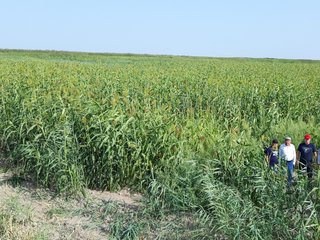
Introduction of sweet sorghum into rice crop rotations to restore degraded saline lands and diversify agricultural production [Kazakhstan]
The introduction of sweet sorghum into rice crop rotations is one of the approaches to restoring degraded lands under conditions of irrigation water scarcity and secondary soil salinization, while also diversifying agricultural production in local communities through the development of a stable fodder base for livestock husbandry.
- Compilateur:
- Kulyash Iskandarova
- First published:
- 2023-03-29 09:08
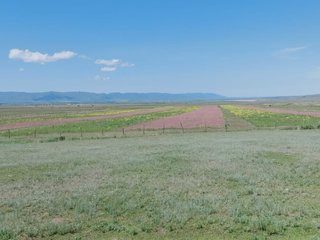
Fundamental Improvement of Low-Productivity Pastures through Strip Planting of Perennial Drought-Resistant Grasses in the Foothill Semi-Desert Zone of Southeastern Kazakhstan [Kazakhstan]
Radical improvement of low-yield pastures by strip placement of perennial drought-resistant grasses in the conditions of the foothill-semi-desert zone of south-eastern Kazakhstan
- Compilateur:
- Kulyash Iskandarova
- First published:
- 2023-02-24 12:17
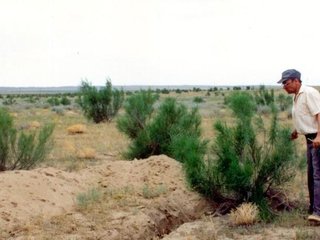
Creation of haloxylon pasture-protective strips at north desert [Kazakhstan]
Localization of erosion processes and moisture accumulation by creation haloxylon strips in pastures of north desert
- Compilateur:
- Unknown User
- First published:
- 2017-05-25 17:59
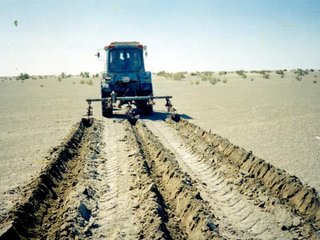
The approach of groove fastening sandy loam and sandy soils of the Aral sea's drained bottom [Kazakhstan]
The approach of groove fastening sandy-loam and sandy soils of the Aral sea's drained bottom
- Compilateur:
- Vladimir Kaverin
- First published:
- 2017-07-17 15:04
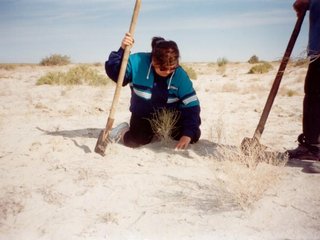
Principle of the excavated disposition of phytomeliorants on a pasturable lands of desert zone [Kazakhstan]
Principle of the excavated disposition of phytomeliorants on a pasturable lands of deserted zone of the Kazakhstan with the purpose of accumulation of an additional moisture and protection of territory against wind erosion
- Compilateur:
- Unknown User
- First published:
- 2017-07-17 15:21
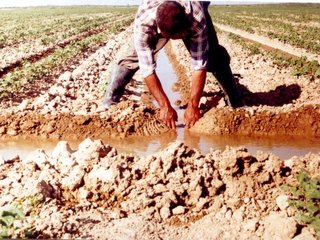
Watering through furrow [Kazakhstan]
Watering through furrow
- Compilateur:
- Unknown User
- First published:
- 2017-07-17 15:39
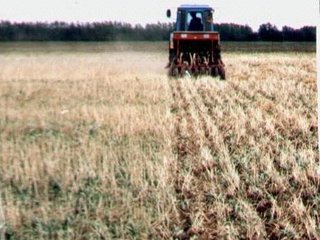
Crop on the stubble background [Kazakhstan]
Stubble crop for cultivation of grain crops (spring wheat).
- Compilateur:
- Ervin Gossen
- First published:
- 2017-07-17 16:04
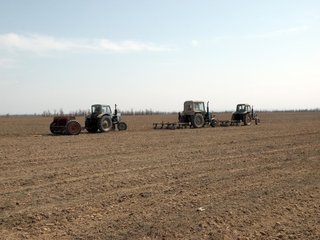
Fallow restoration by no-tillage seeding [Kazakhstan]
Fallow land restoration for fodder production is combined with biodiversity conservation of natural steppe vegetation by no-tillage disc-harrowing and seeding of forage grass in low density.
- Compilateur:
- Heino Hertel
- First published:
- 2017-05-28 17:21
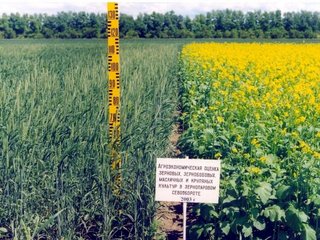
Soil-protective minimal technology of the tillage and sowing [Kazakhstan]
The minimal tillage for cultivation of grain crops (the second and third culture after fallow).
- Compilateur:
- Ervin Gossen
- First published:
- 2017-05-26 12:05
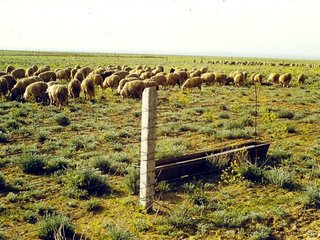
Creation of sowed pastures from subshrubs and forbs able to use maximally the scanty water resources [Kazakhstan]
Increase of use effectiveness of limited resources of soil moisture in desert with sowing xerophyte fodder plants
- Compilateur:
- Irina Skorintseva
- First published:
- 2017-07-17 17:38
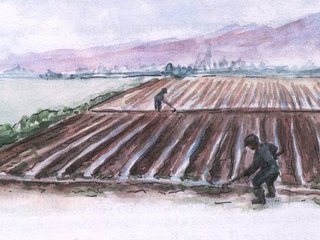
Irrigation using shortened furrows and regulated use of mineral fertilizers [Ouzbékistan]
A resource-saving irrigation technology for row crops using shortened furrows, which enables significant savings of irrigation water and improves the efficiency of mineral fertilizer use on irrigated land.
- Compilateur:
- Oyture Anarbekov
- First published:
- 2017-08-02 23:56
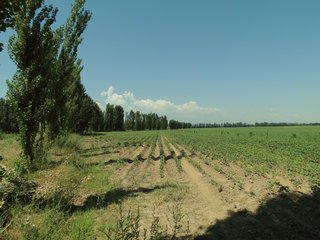
Tree windbreaks within irrigated agriculture in Central Asia [Kirghizistan]
Windbreaks of poplar trees (Populus nigra pyramidalis) are a major agroforestry system in irrigated agriculture across Central Asia. Such windbreaks reduce the overall water consumption of irrigated agriculture by 10-20% and increase farm income by 10-15%.
- Compilateur:
- Niels Thevs
- First published:
- 2021-05-18 14:09
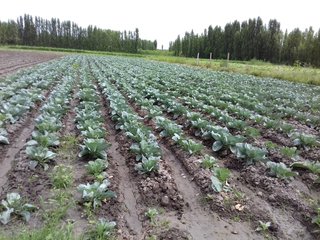
Application of crop rotation in farming conditions [Kirghizistan]
Organizing crop rotations as a way to use land efficiently, taking into account the economic interests of landowners and land users, as well as ecological and economic factors.
- Compilateur:
- Dzhumabaeva Salamatkhan
- First published:
- 2019-09-23 09:21
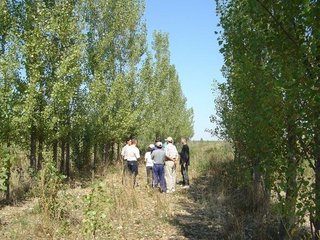
Poplar trees for bio-drainage [Kirghizistan]
Poplars planted to lower the ground water table and reduce salinity where irrigation drainage systems have broken down; lucerne cultivated between the tree lines.
- Compilateur:
- Abdybek Asanaliev
- First published:
- 2017-04-28 10:41
- . . .